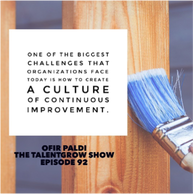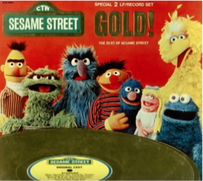 One doesn’t typically associate military practices with vulnerability. However, this is exactly the secret to the world-renowned Israeli Air Force. On her most recent Talent Grow Show podcast, my good friend and colleague, Halelly Azulay, interviewed a former Israeli Air Force Pilot, Ofir Paldi. What he shared about the secrets to their success will baffle you. “By implementing a unique culture and methodology, the Israeli Air Force became one of the best in the world in terms of quality, safety, and training, effectively cutting accidents by 95%.” Can you guess what methodology they use?  Are you ready for this? The Israeli Air Force has created a culture where mistakes are not only accepted but are encouraged to talk about. After each flight, they have a process where all members, from the highest to the lowest ranking pilot, share their mistakes and what they plan to do to improve their actions for the future. When coaching executives, I often conduct 360 interviews from their staff , manager(s), and peers to learn more about the leader’s style and impact on the team. What I have found is that leaders who admit mistakes and are comfortable being vulnerable have stronger relationships with their staff and focus more on continuous improvement. Leaders who choose to hide their mistakes tend to come across as conceited, closed, and disconnected. But why does sharing mistakes work? What is it about being vulnerable in this way that creates a culture of continuous improvement? Based on research and my own experiences, here’s what I’ve discovered: APPLICATION AT WORK Sharing mistakes…
APPLICATION AT HOME And, the value of sharing mistakes does not only apply in the military or in the office. In fact, I first stumbled upon this topic when I was struggling to help my oldest son, as a toddler, improve his self-esteem. Oddly enough, the “solution” I landed on was for my husband and I to talk about mistakes in front of our children. Most of the time, kids will not see the mistakes parents make and assume that parents are perfect. And, the expectation from a child’s perspective is that I need to be perfect too. To make matters worse, most parents hover over their kids and call out every mistake they make throughout the day. I know I was guilty of this for sure. The more you share mistakes openly, the more it builds your child’s confidence and comfort in themselves.  There was a period of time where all of our dinner conversations were about the mistakes we made throughout the day and what we did to recover. If you’re a Gen Xer, you may remember the popular Sesame Street song Everyone Makes Mistakes from the Gold Album. Well, that was a popular tune in our household and became the default tune whenever someone in our family made a mistake. This brought some laughter and humor to the conversation too which always helps! In fact, my kids will still refer back to this song today when I make a mistake… it definitely helps me get over it faster and move on. As leaders at work or at home, we have the ability to either create a culture of shame and anxiety or a culture of learning and continuous improvement. It does take an investment, and it does take courage to be vulnerable but the results are priceless. I’m intrigued to hear how you plan to experiment with these techniques at work and at home. And, once you start experimenting take some time to think about what worked, what didn’t work, and what you can do differently moving forward. Share your stories and experiences with the community. Reply here, send me an email or tweet.
0 Comments
Your comment will be posted after it is approved.
Leave a Reply. |
AuthorLaura Mendelow |
|
|
©2020. All Rights Reserved. Mendelow Consulting Group, LLC.

